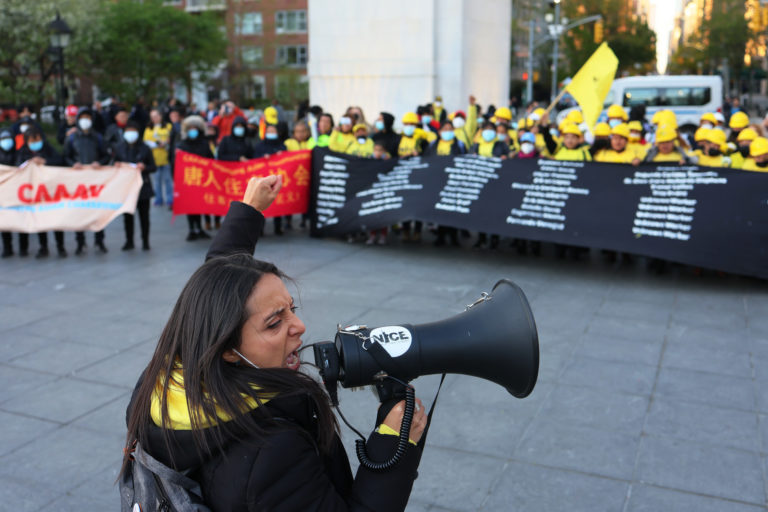In the first day of their strike, Harvard graduate student workers picketed in Harvard Yard, carrying signs, marching, and chanting “What do we want? A contract! When do we want it? Now!” Strike organizers, faculty members, state politicians and union organizers spoke at a rally at 11:30 a.m., in front of a crowd numbering in the hundreds. The union will continue to picket in Cambridge and on Harvard’s Longwood campus in Boston until further notice.
The New York Times reports that construction-industry unions are collaborating with large pharmaceutical companies to block a bill supported by House Democrats that would lower prescription drug prices. The unions, which represent sheet metal and iron workers, electrical workers, plumbers and pipe-fitters, as well as police officers and firefighters, have joined with pharmaceutical companies Pfizer and Johnson & Johnson to form a lobbying group—the Pharmaceutical Industry Labor-Management Association, or Pilma. Pilma has bought Facebook and print ads, and spent nearly half a million dollars on federal lobbying, to oppose the Lower Drug Costs Now Act, which would require the federal government to negotiate the prices of over 250 drugs on behalf of Medicare. According to Pilma’s executive director, Tim Dickson, the group is trying to create jobs for union workers involved in building pharmaceutical manufacturing plants. “We have a longstanding position that we’ve held for quite some time that certain policies, such as price controls, will have a negative effect on union construction jobs,” said Dickson. Many other unions, including the national A.F.L.-C.I.O, the United Auto Workers, and unions representing teachers and other government workers, support the bill.
The Intercept reports that House Speaker Nancy Pelosi has prioritized passage of the U.S.-Mexico-Canada Agreement and Lower Drug Costs Now Act over the Protecting the Right to Organize Act. The Pro Act, which passed the House Committee on Education and Labor in September and currently has 215 co-sponsors in the House and 40 in the Senate, would eliminate right-to-work laws and impose new penalties on employers who retaliate against union organizing. Pramila Jayapal (D-WA), co-chair of the House Progressive Caucus, reports that House leadership remains committed to the bill. But some union leaders are growing impatient. “If you want real strong worker excitement that will get union activists excited for 2020,” said Dan Mauer, director of government affairs for the Communications Workers of America, “this is what we need to get it; the PRO Act is really it.” Pelosi has not indicated when she will bring the bill to the floor.
The People’s Parity Project, a group launched by Harvard Law Students to dismantle barriers to justice for workers and consumers, has successfully lobbied the National Association of Law Placement to include three new questions in its 2020 survey of legal employers to gauge employers’ policies around workplace misconduct, nondisclosure agreements, and mandatory arbitration agreements. That information will be published in the NALP’s law firm directory. “Making information about which firms use forced arbitration more accessible to all law students helps raise awareness of the problem,” said Sarah Bayer, a Harvard Law School student and member of the Project, “which gets us one step closer to our goal of ending forced arbitration, once and for all.”






Daily News & Commentary
Start your day with our roundup of the latest labor developments. See all
December 19
Labor law professors file an amici curiae and the NLRB regains quorum.
December 18
New Jersey adopts disparate impact rules; Teamsters oppose railroad merger; court pauses more shutdown layoffs.
December 17
The TSA suspends a labor union representing 47,000 officers for a second time; the Trump administration seeks to recruit over 1,000 artificial intelligence experts to the federal workforce; and the New York Times reports on the tumultuous changes that U.S. labor relations has seen over the past year.
December 16
Second Circuit affirms dismissal of former collegiate athletes’ antitrust suit; UPS will invest $120 million in truck-unloading robots; Sharon Block argues there are reasons for optimism about labor’s future.
December 15
Advocating a private right of action for the NLRA, 11th Circuit criticizes McDonnell Douglas, Congress considers amending WARN Act.
December 12
OH vetoes bill weakening child labor protections; UT repeals public-sector bargaining ban; SCOTUS takes up case on post-arbitration award jurisdiction